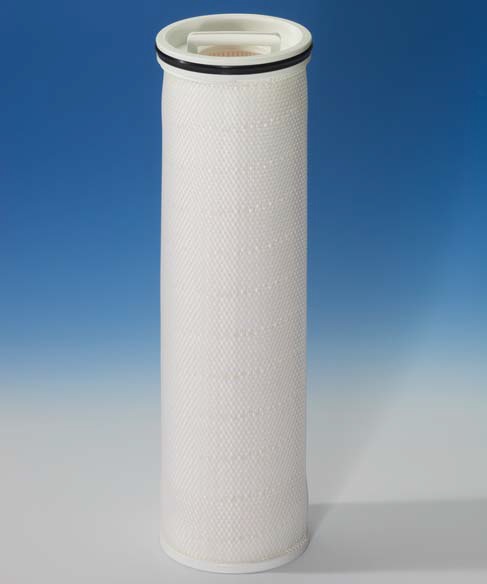The Ultipleat® High Flow filter is a large diameter, coreless, single open ended, pleated cartridge with an inside-to-outside flow pattern. The filter's unique crescent-shaped pleat geometry, combined with its large 152.4 mm (6 inch) diameter and proprietary range of available Pall filter media, allows you to use significantly fewer filters and smaller housings for high flow rate applications. Systems can handle up to 115,443 lpm (30,500 gpm).
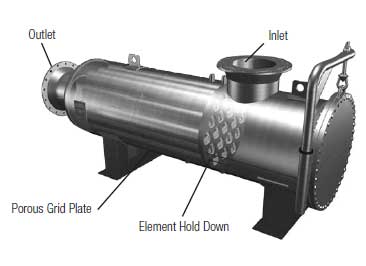
Benefits
- Up to 50% smaller filter system possible
- Up to 40 times fewer elements to change out
- Higher flow rates per filter cartridge – up to 1900 lpm (500 gpm)
- Available in 508 mm (20 inch), 1016 mm (40 inch), 1524 mm (60 inch) and 2032 mm (80 inch) lengths
- Coreless, all plastic construction to minimize waste disposal
- Absolute rated filter medium for reproducible performance
- Inside-to-outside flow configuration – all debris stays within the filter
Materials of construction
| Filter Medium Type | Filter Medium | Support/Drainage Materials | End Caps | Wrap Materials |
| HDC® II Medium | High Area Polypropylene Structure | Polypropylene | Glass Filled Polypropylene | Polypropylene and Polyolefin Hotmelt |
| Profile® Medium in Ultipleat Format | Pleated Polypropylene Depth Structure | Polypropylene | Glass Filled Polypropylene | Polypropylene |
| Ultipor® GF Medium | Resin Bonded Glass Fiber / Polyester Support | Polyester / Nylon | Glass Filled Acetal | Polyester and Polyamide Hotmelt |
| Ultipleat CAS Medium | Pleated Polypropylene / Polyether Sulfone Membrane | Polypropylene | Glass Filled Polypropylene | Polypropylene |
Operating Conditions
| Polypropylene Medium/ CAS Composite Medium | Glass Fiber Medium2 | |
| Maximum Differential Pressure1 (normal inside to outside flow) |
3.4 bar at 82°C/ 50 psid at 180°F | 3.4 bar at 121°C/ 50 psid at 250°F |
1) For fluids compatible with the filter element at the stated temperature.
2) Maximum temperature in aqueous systems is 60°C / 140°F for GF medium.
Housing Design
Three configurations are available: horizontal6, vertical and centerpipe design.
The in-line horizontal configuration eliminates the need for a platform, or ladder, to remove the filters from the housing.
Vertical vessels may be more appropriate when floor space is limited. However, a platform may be needed to easily remove the elements.
In both the standard horizontal and vertical configurations, the inlet pipe is located between the filter element tubesheet and housing lid. The larger the vessel diameter, the longer the distance to reach in and remove the elements from the vessel. In a centerpipe vessel the housing lid is closer to the filter tubesheet. When the lid is opened the filters are easily accessible for installation and removal. Centerpipe vessels are larger in diameter, and more costly.
- Designed to the ASME, section VIII, division 1 code
- Maximum differential pressure across tubesheet: 5.17 bard (75 psid) maximum
- Standard housing gasket: spiral wound 304 stainless steel mineral fiber
- Carbon steel exterior surfaces: sandblasted and coated with an inorganic zinc
- Vent and drains: 1 inch FNPT
- Corrosion allowance: 1/8 inch
Housing Ratings
| Vessel Material | Tubesheet and Hold Down Plate Material of Construction | Pressure Rating in Barg/Psig at 60°C / 140°F |
| Carbon steel | 304 stainless steel | 18.95 bar (275 psig) |
| 304 stainless steel | 304 stainless steel | 17.85 bar (259 psig) |
| 304L stainless steel | 304L stainless steel | 14.89 bar (216 psig) |
| 316 stainless steel | 316 stainless steel | 17.99 bar (261 psig) |
| 316L stainless steel | 316L stainless steel | 14.89 bar (216 psig) |
Figure 1: Ultipleat High Flow Horizontal Housings (Aqueous Housing Pressure Drop)
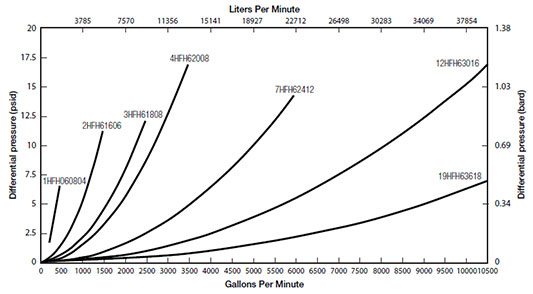
Filter Installation and Filter Seal Mechanism
To install a filter element, remove the element hold down plate by lifting it off the locating pins. Lubricate the Oring on the open-end of the filter with a compatible fluid, and slide the closed end of the filter into the perforated cage, which is welded to the tubesheet. Seat the elements in place by pressing down on the open-end of the filter until the element is snug in the tubesheet. This provides a seal between the filter and housing via the filter O-ring. The open-end cap must be below the tubesheet surface. After installing all the filter cartridges, reinstall and secure the element hold down plate by guiding it over the locating pins on the tubesheet. The purpose of the hold down plate is to prevent the elements from becoming dislodged in the event of reverse flow.
A filter element tool is provided with each housing to aid with the installation and removal of the filter cartridges. This tool eliminates the need for an operator to reach within the filter vessel to either remove or install filters.
WATCH OUR VIDEO to discover how to service rental equipment when we cannot be present and appreciate how simple the process is.
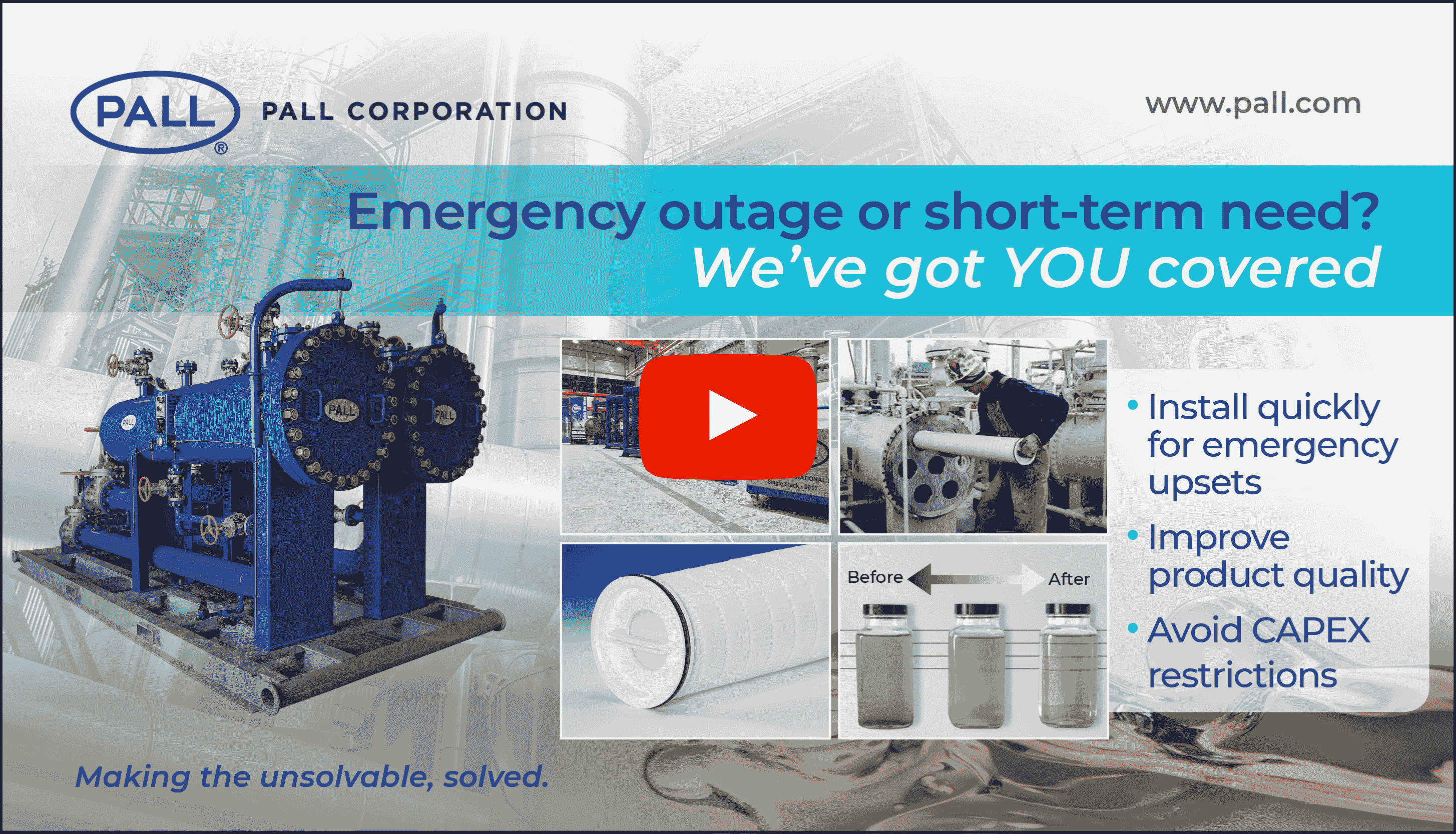
Filter Cartridge Part Number = HFU [1] [2] [3]
Table 1
| Code | Filter Dimensions, nominal, diameter (mm/in) x length (mm/in) | Suggested Maximum Water Flow Per Cartridge (lpm/gpm/mgd) |
| 620 | 152.4/6 x 508/20 | 663/175/0.25 |
| 640 | 152.4/6 x 1016/40 | 1325/350/0.5 |
| 660 | 152.4/6 x 1524/60 | 1900/500/0.7 |
| 680 | 152.4/6 x 2032/80 | 1900/500/0.7 |
Filter Cartridge Pressure Drop (typical) per Filter Length Shown2
Table 2
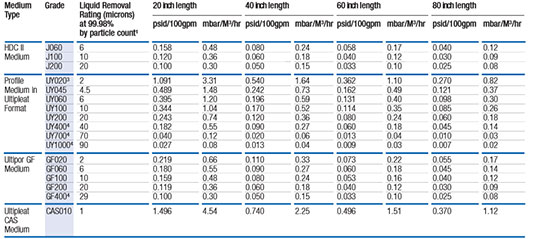
1 The test procedure used is an adaptation of ISO 4572, modified to determine the micron size above which particles are quantitatively removed.
2 Multiply this value by the total system flow to determine the aqueous pressure drop. For fluids other than water, multiply this value by the fluid’s viscosity at the operating temperature in centipoise. This value is the pressure drop across the Ultipleat® High Flow filter(s) only; it must be added to the pressure drop contribution from the Ultipleat High Flow filter housing.
3 2 micron at 99% efficiency.
4 Precision evaluation of the 99.98% removal efficiency for these coarse grades is not possible with the ISO modified test procedure utilized. The removal efficiency was determined by the maximum spherical particle analysis.
Table 3
| Code-Filter O-Ring | Material |
| H13 (standard for glass fiber and aramid fiber filters) | Nitrile |
| H13U5 | Nitrile U-Cup |
| J (standard for polypropylene filters) | Ethylene propylene |
| JU5 | Ethylene propylene U-Cup |
| H4 | Silicone |
| H | Fluoroelastomer |
5U-Cup seal is standard for the 1 micron composite filter.
Ordering Information-Standard Horizontal and Vertical Housings

Ordering Information - Horizontal Orientation, Centerpipe Designed Housings

7 For 60 inch filter lengths
Table 1
| Code | Housing configuration |
| H | Horizontal |
| V | Vertical |
Table 2
| Code | Nominal cartridge length (mm/in) |
| 2 | 508/20 |
| 4 | 1016/40 |
| 6 | 1524/60 |
| 8 | 3032/80 |
Table 3
| Code | Housing metallurgy |
| 285 | Carbon steel vessel, 304 stainless steel tubesheet |
| S3 | 304L stainless steel |
| S8 | 304 stainless steel |
| L3 | 316L stainless steel |
| L8 | 316 stainless steel |
Table 4
| Code | Optional outlet size8 horizontal housings |
| XU | Upper outlet location |
| XL | Lower outlet location |
8 If the housing is to be used as a prefiller to a horizontal liquid/liquid coalescer, then the vessel should be ordered using the XU or XL option for the outlet location. The orientation of the outlet should be the same as that of the sump on the coalescer. In this way no buildup of coalesced liquid will occur in the prefilter
Horizontal Housings
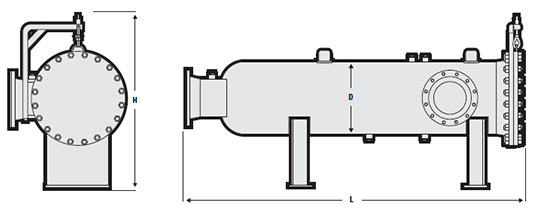
Horizontal Housings, Centerpipe Design
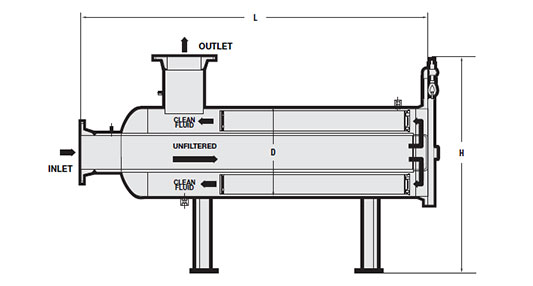
Ultipleat High Flow Filter System Reduces Costs
Begin reducing your capital and operating costs today. Contact your local Pall distributor or call Pall directly for an Ultipleat High Flow filter system quotation.
Earn 10% off* your next order online by leaving a review of this product. Please login to your account to leave a review. We appreciate and value your feedback.
*Subject to Terms and Conditions.



